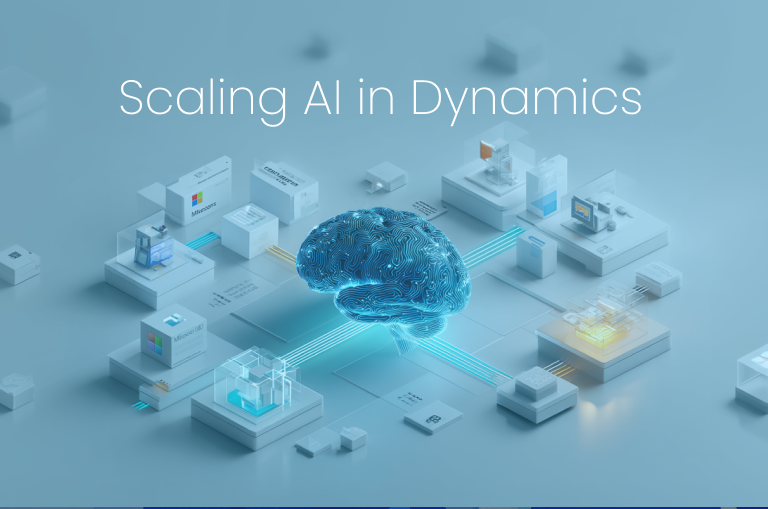Beyond pilot projects: scaling AI in Dynamics across departments
Introduction: moving past the pilot phase
Many organisations start their AI journey with small, isolated experiments. A proof-of-concept in sales forecasting or a chatbot pilot in customer service often generates excitement but stalls when leaders ask how to expand it across the business. The reality is that scaling AI is more complex than testing it. It requires not only technology but also governance, adoption, and cultural readiness.
Microsoft Dynamics 365 is well-positioned to bridge this gap. With built-in AI features, integration through Dataverse, and extensions like Copilot and Azure OpenAI, it provides enterprises with a practical foundation for transforming AI pilots into enterprise-wide capabilities. At ARP Ideas, we see first-hand how businesses move from trial to transformation - and where the pitfalls lie.
The market needs enterprise-scale AI.
AI adoption is accelerating. According to Gartner, 79% of corporate strategy leaders report that AI is critical to their success. Yet most deployments remain limited to departmental pilots. The challenge is to ensure AI brings measurable value across the enterprise, not just in isolated teams.
Dynamics 365 makes this possible by embedding predictive insights in Sales, real-time case resolution in Customer Service, and Financeting tools in Finance. When these capabilities are scaled, the organisation begins to operate with consistent intelligence across the customer journey, back-office processes, and strategic planning.
At ARP Ideas, we help organisations define their AI vision, align it with business outcomes, and set up a roadmap for enterprise adoption. The need is clear: companies that integrate AI widely are more resilient, more efficient, and better prepared for shifts in the market.
What scaling AI in Dynamics really means
Scaling AI goes far beyond rolling out more licences or enabling a few extra features. It is about embedding intelligence into everyday operations, allowing the teams to make faster, data-driven decisions.
Core elements of scaling
-
Technology: extending Dynamics 365 Copilot across departments and integrating with Azure OpenAI for advanced use cases.
-
Data: ensuring information flows through Microsoft Dataverse and, where appropriate, into Microsoft Fabric for advanced analytics.
-
Process: redesigning workflows so AI insights are part of the decision, not an afterthought.
-
People: training teams to trust, understand, and act on AI recommendations.
Scaling is not a one-off project. It is a journey where every step builds on the previous one, supported by governance, compliance frameworks, and business alignment.
Benefits of scaling AI across departments
When AI is implemented at scale in Dynamics, the impact can be seen across multiple areas of the business.
| Department | Before AI at scale | With AI scaled in Dynamics |
|---|---|---|
| Sales | Manual lead qualification and inconsistent pipeline visibility | Predictive lead scoring and opportunity prioritisation with Dynamics 365 Sales and Copilot |
| Finance | Static forecasting and delayed anomaly detection | Real-time forecasting and fraud detection powered by AI in Dynamics 365 Finance |
| Customer Service | Reactive ticket handling and agent overload | Intelligent case routing, suggested responses, and knowledge recommendations through Dynamics 365 Customer Service. |
| Operations | Limited visibility into supply chain risks | AI-driven demand forecasting and optimisation within Dynamics 365 Supply Chain Management |
These examples show the tangible value of scaling AI. Instead of isolated improvements, businesses achieve enterprise-wide resilience, efficiency, and agility. ARP Ideas’ experience with mid-size and enterprise clients confirms that cross-departmental deployment produces compounding returns: bFinance forecasting in finance strengthens supply chain planning. At the same time, sales insights feed directly into customer service personalisation.
Common challenges and misconceptions
Scaling AI comes with its own set of obstacles, and addressing them openly is essential.
Misconceptions and responses
-
AI replaces people
-
Reality: AI augments human decision-making. In customer service, for instance, Copilot suggests responses, but the agent retains control.
-
-
Data silos make scaling impossible.e
-
Solution: Microsoft Dataverse and Fabric unify data sources, ensuring insights are consistent and accessible.
-
-
AI governance is too compl.ex
-
Approach: Establish responsible AI policies early, aligned with Microsoft’s Responsible AI Standard.
-
-
Scaling requires massive investment.
-
Alternative: adopt a phased approach, starting with one department, measuring ROI, and expanding gradually.
-
At ARP Ideas, we help organisations anticipate these challenges. By combining technology expertise with change management, we ensure that scaling AI is achievable without disruption.
Real-world scenario: scaling from sales to service
Consider a mid-size B2B organisation that began by using Dynamics 365 Sales to prioritise leads with predictive scoring. The sales team quickly reported improved win rates, as high-potential opportunities rose to the top of the pipeline.
Building on this success, the business extended AI to customer service. By introducing Copilot, service agents could resolve cases faster, aided by suggested knowledge articles and response drafts. This not only improved customer satisfaction but also reduced agent burnout.
The finance team then adopted anomaly detection in Dynamics 365 Finance, allowing for real-time identification of irregular invoices. Over time, these improvements created a connected chain of intelligence, where insights from sales influenced service interactions, while financial forecasting guided strategic investment decisions.
ARP Ideas supported this journey by designing the integration roadmap, ensuring data quality, and training teams. This phased, practical scaling demonstrates how AI can move from isolated wins to enterprise-wide transformation.
Future outlook: AI as a standard, not a pilot
AI in Dynamics 365 is shifting from experimental to mainstream. Generative AI, embedded through Copilot, is now becoming a standard feature rather than an add-on. Integration with Power Platform means AI-driven workflows can be automated across apps, while Microsoft Fabric strengthens unified analytics.
In the future, AI governance models will become as common as data protection policies. Businesses that scale today will be well-positioned to take advantage of these developments, while those stuck in the pilot stage risk being left behind.
Scaling is not about chasing the latest technology. It is about preparing the organisation for a future where AI is simply part of how business is done.
Key takeaways
-
Scaling AI in Dynamics is about embedding intelligence across teams, not running isolated experiments.
-
Finances span sales, finance, customer service, and operations, with compounding impact.
-
Challenges such as governance, data silos, and misconceptions can be addressed with the right approach.
-
A phased rollout ensures measurable ROI while building organisational trust.
-
ARP Ideas provides the expertise to move businesses beyond pilots and into sustainable adoption.
FAQ
Q: Do I need a dedicated data science team to scale AI in Dynamics?
A: No. Microsoft Copilot and Azure OpenAI make AI accessible without specialist teams, although expertise in governance and integration is essential.
Q: How do we ensure AI outcomes are fair and ethical?
A: Adopt responsible AI frameworks, regularly audit outputs, and use Microsoft’s built-in responsible AI tools to mitigate bias.
Q: Is scaling AI suitable for mid-size businesses, or only large enterprises?
A: Mid-size organisations often see faster ROI because they can adapt processes more quickly. Dynamics 365 offers scalability for both.
Q: Can we expand AI gradually without disrupting current operations?
A: Yes. A phased approach allows businesses to start small, measure results, and expand in stages without significant disruption.
Conclusion
Scaling AI across departments is no longer optional for organisations that want to stay competitive. Dynamics 365 provides the foundation, but fundamental transformation comes from aligning technology with strategy, process, and people.
At ARP Ideas, we partner with organisations to guide this journey, helping them move confidently beyond pilots into enterprise-wide adoption.
Talk to our experts about taking AI in Dynamics beyond pilots and into lasting impact.


